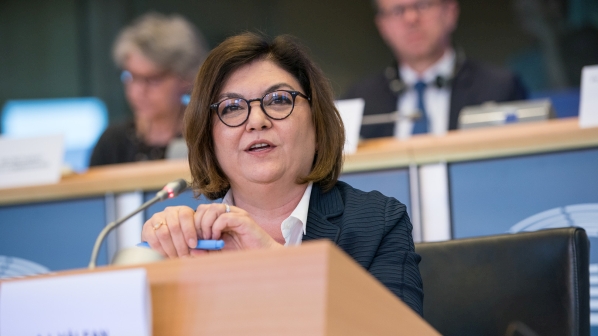Vălean’s strategy includes measures to improve transport’s environmental footprint, improving safety, expanding transport options and facilitating digitalisation.
After receiving approval from the committee, the Conference of Presidents will decide on November 21 whether the European Parliament has received sufficient information to declare the hearing process closed. If so, the plenary will vote on whether or not to elect the full Commission on November 27.
While Vălean did not mention rail specifically during her opening speech, she did highlight measures that have been called for by the rail industry, including a reduction in CO2 emissions across the transport industry, reducing and eventually eliminating subsidies for airlines, and promoting Mobility as a Service (MaaS).
“The freedom to live, work, study and do business anywhere in Europe is one that citizens value the most,” Vălean says. “Transport makes this possible. Mobility and transport are the backbone of the internal market and support the freedom of movement of citizens and goods.”
The president-elect of the European Commission, Mrs Ursula von der Leyen, has signalled that the European Green Deal will be a priority for the commission. Vălean told Tran that the deal will need transport at its core and must ensure Europeans are able to enjoy affordable access to sustainable and smart mobility.
Vălean, the former chair of the Environment Committee, said the completion of the clean energy package would enable significant emission reductions after 2030, but added that more needs to be done.
“By 2050 we want to be carbon neutral and that needs additional efforts,” she says. “I will work hard to reduce the environmental footprint of mobility and transport activities and make sure our actions further contribute to the reduction of carbon emissions and improve their quality. All of this must be an economic success if we want citizens to embrace it and the world to follow our lead.”
To achieve a climate neutral economy by 2050, transport’s CO2 emissions will need to be reduced by 90%, but Vălean pointed out that current measures would only result in a 20% reduction.
“It's absolutely necessary to check out our actions on three crucial areas. First, incentivising direct consumer choices and low emission practices, then improving efficiency across the whole transport system. And thirdly, increasing the uptake of clean vehicles and alternative fuels.”
In a position paper, Rail’s priorities for the European Green Deal, the Community of European Railways and Infrastructure Companies (CER) called for fuel used in international aviation and maritime shipping to be taxed and calls for an end to air travel subsidies and the expansion of road charging. Vălean said during her speech that she was in support of these measures.
“Reducing the allowances to airlines with the aim of eliminating them over time, it’s part of my mission, and extending the emission trading scheme to the maritime sector is something which will bring a valuable change,” she says. “However, pricing will only work if more sustainable alternative remains attractive, affordable and available. Otherwise, change will be at the expense of disadvantaged groups or peripheral regions, which would be unacceptable.”
Vălean said she also wanted to promote MaaS, make alternatives to conventional private cars affordable, adjust infrastructure and embrace smart and collaborative solutions.
“Our cities are suffocated by congestion too,” she says. “We owe it to our citizens to free their urban mobility and stop wasting their time and money. Overall, we must take all transport modes sustainable, and not only do we need to improve our standards, but we must also ensure that clean mobility solutions are widely adopted and deployed.”
CER also called for the EU to significantly increase the Connecting Europe Facility (CEF) budget for transport, and while Vălean didn’t speak of expanding it, she did pledge to stop it from being reduced.
“I have opposed the cuts under the current multi-annual financial framework, and I’m committing in front of you that I will defend the budget for CEF for the next financial framework,” she says. “Transport infrastructure is vital for enabling the European defence strategy. Improved mobility for our troops and equipment should not be overlooked when we invest in infrastructure and dual use facilities for civilian and military purposes are a major opportunity for our union and should be a strategic choice.”

